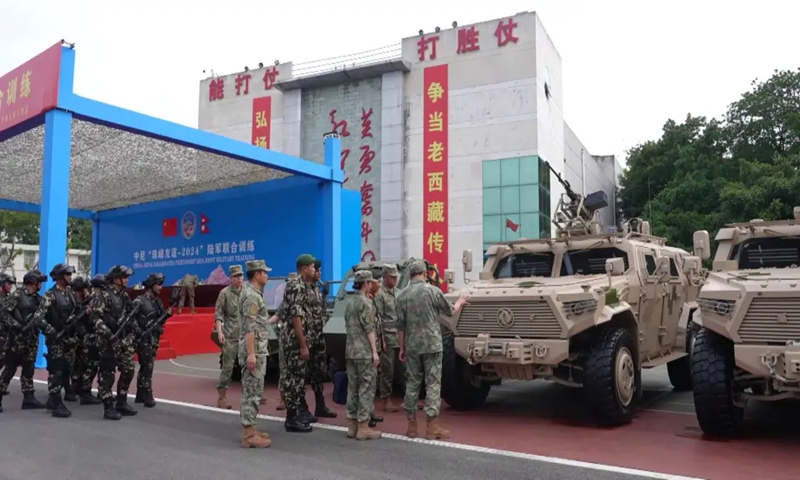
China and Nepal kick off the Sagarmatha Friendship-2024 joint army drill at a training base in Southwest China's Chongqing Municipality on September 22, 2024. Photo: Screenshot from China Central Television
On Sunday, China and Nepal kicked off an anti-terrorism joint army exercise, with a type of ball-shaped reconnaissance drone making its debut.
An opening ceremony was held for the Sagarmatha Friendship-2024 joint army drill at a training base in Southwest China's Chongqing Municipality on Sunday, the Xinhua News Agency reported.
It is the fourth edition of the Sagarmatha Friendship series of exercises between the Chinese and Nepali militaries, with the previous drill held five years ago in 2019, Xinhua reported.
Under the theme of joint anti-terrorism operations in urban blocks, the joint training will include light arms shooting, anti-terrorism group tactics, drone operations, emergency rescues and a comprehensive anti-terrorism exercise, with the aim of boosting capabilities in fields such as multidimensional search, mobile infiltration and armed rescue in joint operations, according to Xinhua.
The exercise will last until October 1, the report said.
After the opening ceremony, the Chinese side displayed more than 20 pieces of equipment in three categories, namely light arms, reconnaissance gears for anti-terrorism missions and equipment, China Central Television (CCTV) reported.
Intelligent reconnaissance equipment attracted particular attention, including a type of robot dog, a type of through-wall radar and a type of self-propelled ball-shaped reconnaissance drone, the report said.
The gear will provide extra combat capabilities in the joint exercise, CCTV said.
A CCTV clip showed that the ball-shaped reconnaissance drone, equipped with a camera and sensors, can be held with one hand.
After viewing the clip, a Beijing-based military expert who requested anonymity told the Global Times on Sunday that the mini ball-shaped drone can move through urban areas by rolling on the ground with little noise and avoid hostile detections.
The small drone is expected to cost little, but can significantly reduce the risk of personnel exposure under dangerous environments, the expert said.
During the exercise, the two sides will also conduct exchanges on disaster relief operations, tackling natural disasters such as earthquakes, snow damages and debris flow, in addition to a series of cultural exchanges to enhance mutual trust and understandings, Xinhua reported.




